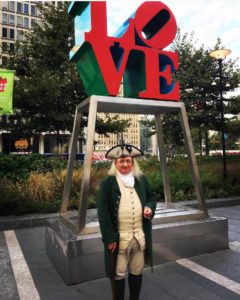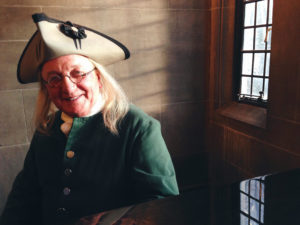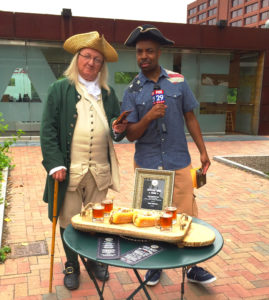
“When I talk to students—I emphasize that as soon as is possible for you, work at something you love. Many of us spend a lot of years not doing that. Eventually I was able to make a living doing what I love doing. It really makes a difference.”~ Bill Robling, historic interpreter of Benjamin Franklin, founding father.
More than 40 years ago, Bill Robling landed his first acting role in the musical “1776.” The musical tells the story of the people and events surrounding the signing of the Declaration of Independence. Little did Robling know that one day his first acting gig would come full circle in his current role as a historical actor portraying the great Ben Franklin in the city of Philadelphia. Franklin, one of our country’s founding fathers, signed the Declaration of Independence. Robling has portrayed the celebrated historic figure for the last 15 years.
As Robling notes on his LinkedIn profile: “I am a Franklin for all seasons and all reasons.” In his role as a historic interpreter, Robling provides educational programming, corporate meet and greets, and convention and conference welcoming addresses. He works for Historic Philadelphia Incorporated, Tippler’s Colonial Pub Crawl, and has even officiated a pirate wedding (yes, you read that correctly). His goals as Franklin are to educate, engage, and entertain.
In light of Ben Franklin’s 312th birthday (Jan. 17), Philly Happening caught up with Robling to get the dish on how he came to be Ben Franklin, how he prepared for the part, and what he loves about his craft.
P.H.: Tell us how you became Ben Franklin.
B.R.: I moved into the city from the suburbs 17 years ago. “I decided that I really wanted to go into the field of historic acting and historic interpretation and soon after, people started suggesting that I portray Ben Franklin. I came into it as an actor with a strong interest in history, so this role just seemed like a natural mix for me.
P.H.: What were you doing before you were Ben Franklin?
B.R.: I was bringing up my son. I worked for several different companies. I taught school early on. I worked in personnel in a department store. I worked as a training professional for The Postal Service. I was in management for the postal service. [Interestingly enough, Ben Franklin was Postmaster of Philadelphia in 1737 and was appointed Postmaster General under the Second Continental Congress in 1775].
I grew up in the state of Indiana and first moved to the east in 1971. I lived in the Philly suburbs for 14 years. Over the years, I moved closer and closer the city.

P.H.: How did you prepare to become Ben Franklin?
B.R.: Over the last 15 years or so, I have logged a few thousand hours not only in studying Franklin and his times, but in portraying him, and it’s something that I very much enjoy doing. It’s a passion. Fortunately, I’m able to make a living doing it these days. It’s an acting niche.
I studied everything I could from biographies of Franklin to his own writings. I have good resources. I’m pretty well-acquainted with some professors and academics. I use them as resources a lot. I’m not only interested in studying Franklin himself, but studying his times. I don’t just like to dress up and say Franklin’s words, I like to get inside of him as much as I can. I call it “acting from the inside out.” It’s an ongoing process.
The wonderful but also daunting thing about Franklin is there is so much information about him. All these years later, I’m still finding things that surprise me. He lived 84 years and he did so many different things. It challenges me to portray him and I love it.

P.H.: What are some things about Ben Franklin’s life that would surprise people?
B.R.: People think they know about his scientific work—most of the time they just think of him as this wacky inventor, and that’s really not true. In fact, he never called them “inventions,” he called them his “improvements.” He was the type of person where if something didn’t work how he wanted, he just tried to make it better.
A lot of people are not aware of his serious scientific work. He was regarded as one of the premier scientists of the 18th century. He was inducted into the Royal Society of London, which is dedicated to promoting excellence in the sciences, and he was awarded the Copley Medal, for his published writings about electricity. In the 18th and 19th centuries, the Copley Medal was the equivalent of today’s Nobel Prize. Franklin was the second person to ever receive that honor. He coined the term “current,” in regard to electricity and how it travels and many physicists credit that idea as an important precursor to the discovery of the electron.
Franklin also made the first map of the Gulf Stream. He was inspired to do this after hearing about it while growing up near the coast and he sailed across the Atlantic eight times. The map turned out to be very accurate.
His worldwide fame in the Western world is what made it possible for him to do his diplomatic work. Franklin was sent to England and Paris because he was the most famous American of his time and one of the most successful business people of America. He was one of the first journalists in America with the largest circulation newspaper (The Pennsylvania Gazette. He is also widely known for Poor Richard’s Almanack). Franklin was the most published writer in America during the 18th century. He was kind of the Mark Twain of the 18th century because he had a lot of satirical writing and used pseudonyms.
[ According to PBS.org, Franklin’s first psuedonymn “Silence Dogood” was created when he was 16 and serving as a printer’s apprentice to his brother James. Silence Dogood was a middle-aged widow who looked at the world with a humorous and satiric eye.]
P.H.: What were Ben Franklin’s strongest traits?
B.R.: Curiosity and Practicality!

P.H.: Tell us more about what projects you do as Ben Franklin.
B.R.: The first big project I did was in 2004. I got cast in the History Channel movie about Franklin based on the Walter Isaacson biography that had just came out. I don’t have a speaking role, but I am on the screen constantly. They still show it on TV.
The company that I work the most with is Historic Philadelphia Incorporated, a non-profit that runs Franklin Square and the Betsy Ross House.
I do the Tippler’s Tour Colonial Pub Crawl. On the tour you go to four different places, you are told stories, you have the chance to ask the historic actors questions and there are photo opportunities! They had special Tippler’s Tours leading up to Ben Franklin’s birthday (on Jan. 17).
I also do Independence After Hours. This year will be the 12th year that I’ve done that. The evening starts with dinner at the City Tavern, 138 S. 2nd Street and then you get taken over to Independence Hall After Hours where you see Franklin and (John) Adams and (Thomas) Jefferson discussing The Declaration of Independence. In the peak of the summer, we do that show five nights a week and then weekends through the fall.
I do a lot of freelancing with school programs, business groups, corporate meet and greets, trade shows, conventions, and as a Keynote speaker.
I just got booked to do something next month—I am going to speak to students at The Constitution Center for a seminar on internet security and safety. Ben Franklin is going to talk to them from the standpoint of a journalist about the dangers of gossip and slander and false information.
Robling with Quincy Harris of Fox29 being interviewed on July 4th about the Tippler’s Tours in Historic Philadelphia.
P.H.: I read that you also officiate weddings as Ben Franklin?
B.R.: Yes! I just did my eighth wedding as Ben Franklin officiating! I just did my first same-sex wedding, I’ve done a wedding on a river boat, and I once did a pirate wedding for pirate reenactors who wanted to be married by Ben Franklin instead of a pirate!
P.H.: Where did you go to college? Did you study acting?
B.R.: I attended college in Nashville, TN., and did some graduate work at Indiana University. I majored in religion and communications. I got involved in theatre and the first musical that I did was ‘1776,’ (which tells the story of the people and events surrounding the signing of the Declaration of Independence). I didn’t think twice about ‘1776’ then, but it’s funny to look back all these years later and see the connection to what I’m doing now! After that, I was in a small opera company for a few years. I tried to do as much acting work as I could. Over the years I did a variety of other jobs.
You have to pay your dues and you have to do the necessities of life. When I talk to students—I emphasize that as soon as is possible for you, work at something you love. Many of us spend a lot of years not doing that. Eventually I was able to make a living doing what I love doing. It really makes a difference.
P.H.: What’s the most rewarding part of playing Ben Franklin?
B.R.: Never hating to go to work! And the people that I meet. Senior citizens are my favorite audience. They’re usually there to hear me speak because they want to be there. They’re ready to listen, they’re always fun. In general, it’s rewarding to be with interesting people and it’s fun to be somebody other than myself!
Photos courtesy of Bill Robling.





